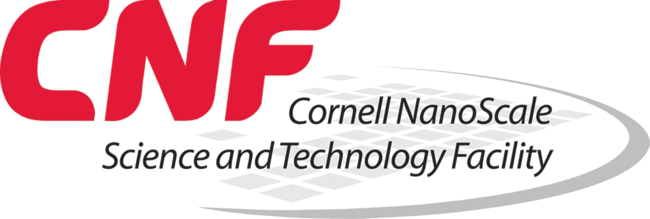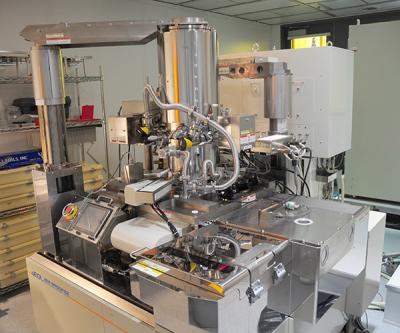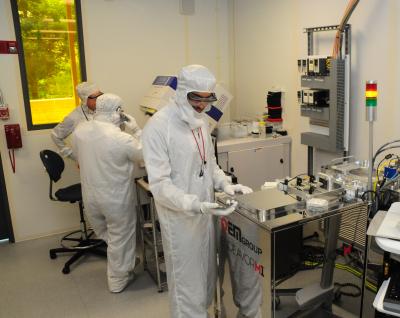Application Deadline: November 15, 2025
CNF, along with its partners Tompkins Cortland Community College and the Penn State Center for Nanotechnology Education and Utilization, is pleased to offer a new workforce development certificate program in microelectronics and nanomanufacturing technology. It is totally free, thanks to the support of the ATE program at the National Science Foundation.
This program has been previously offered at partners in Atlanta, Norfolk, San Diego, and Phoenix, and is now also being offered here in CNY and at other new sites in Columbus and Dallas.
Application link
For more information, please contact
- Lynn Rathbun, Ph.D. CNF Laboratory Manager, LCR2@cornell.edu, 607-254-4872
- Carrie Whitmore, Director of Continuing Education and Workforce Development, TC3, clw@tompkinscortland.edu, 607-844.6586.
Frequently Asked Questions
What do you mean by Microelectronics and Nanomanufacturing? What does the course cover?
This course will cover the basic technologies used to fabricate microelectronic devices, including laboratory safety, vacuum technology, patterning, thin film deposition and etching, microcopy, and characterization. Microelectronics is, however, just one manifestation of the broad field of nanotechnology, i.e. science and applications taking advantage of the unique properties available when you explore very small structures, those nearing the atomic scale.
Who is eligible?
This program is open to anyone interested in entering the microelectronics workforce.
Who is who?
This program is managed by Penn State in conjunction with seven regional teams across the country, in areas where there is significant demand for microelectronics workforce. The Penn State CNEU has been active in workforce training in the microelectronics realm for over 20 years. The CNY team consists of Tompkins Cortland Community College and the Cornell NanoScale Facility. The program is funded by the National Science Foundation.
What are the roles of the different institutions?
Penn State created this program, based on many years’ experience with similar programs offered on campus at State College. For this program, lectures are streamed live to sites, mostly by Penn State staff but there will also be guest lectures from others. Tompkins Cortland Community College will provide primary student academic and career support services, including advising, counseling, placement, etc. The Cornell NanoScale Facility will provide laboratory access and hands on activities in the CNF cleanroom.
Is this program new?
This program is new to CNY, but Penn State has successfully conducted this program with sites in Arizona, California, Virginia, and Georgia three times in 2023 and 2024.
Why New York and why now?
While California, Texas, and Arizona talk a good game about being high technology hubs, upstate New York has had a long history as a high technology region, with dozens of small and large companies from Albany to Corning and from Rochester to Binghamton. And Tompkins County sits right in the middle. And there has been significant demand for entry level laboratory and manufacturing technicians throughout the region. The announcement in 2022 that Micron would build a huge fabrication complex in Clay, NY, however, elevated the situation considerably. Micron itself will require 10s or thousands of workers, with another similar amount in surrounding support industries. Many of these will be entry level positions. The federal government, the state, and NY academic institutions are all implementing programs to address this need.
Can I take other courses simultaneously?
This course is a significant time commitment, particularly for those just reentering the classroom. We do not recommend taking a significant course load in addition to this program.
How many credits is this course? How does it fit with my GI Bill benefits?
At this time , this is a NON CREDIT course. Students may need to take additional TC3 credit-bearing courses in order to obtain GI Bill funding. Please consult with TC3’s Veterans Financial Aid Officer for further information re: your situation.
What student support resources can TC3 offer?
Technical support and advisement are provided by Tompkins Cortland staff dedicated to the project. Resume writing is provided by the training program and is also available at TC3. Tompkins Cortland Health and Wellness Services provides integrated services and programs to promote inclusive individual and community well-being. We offer five distinct areas devoted to students: the Health Center, Mental Health Counseling, the Collegiate Recovery Program, Health Education and Alcohol and Drug Prevention programs, and the on-campus Panther Pantry.
What does it cost?
The course is entirely free. There are no fees to pay and no text books to buy, as all material will be available online. In addition, a small stipend may be available to cover parking and transportation expenses.
Will there be homework and tests?
There will be weekly reading assignments to supplement the lectures. Each student will also have an independent research project to prepare and present a report on a particular process, issue, or company related to micro and nanotechnology in an area that interests them. There will be quizzes every few weeks.
What about logistics and format?
The course will be live streamed from Penn State, daily M-F, 11:30am-1:30pm. The Spring 2026 session will run January through April 2026. This will be the final offering of this program. Lectures will be recorded as well, but we recommend that students participate together in a classroom setting at TC3 (or at Cornell on “Lab days”). There will be 1-2 afternoons per week of hands on laboratory activity at Cornell, in the CNF cleanroom. Field trips to local industries may replace some scheduled lab activities.
What is a cleanroom?
Microelectronics is about fabricating MILLIONS of tiny devices, and they ALL have to work. Contamination is thus a big issue. A dirt, dust, or hair particle looks like a GIANT boulder relative to our precious product, so we work in a special laboratory (or factory) where the air is constantly filtered. And we wear head-to-toe “bunny suits” to protect our work from “us”!
Are there prerequisites? What level of prior knowledge is required?
This is an introductory course. It does involve some science: we will talk about atoms, molecules, simple chemical reactions, the periodic table, and the properties of materials, etc., but all at an introductory level, not even at the high school chemistry level. Similarly, simple mathematics including unit of measure, order of magnitude, and unit conversions will be required.
What happens after the 12 week course?
Upon successful completion you will receive a certificate from the Penn State Center for Nanotechnology Utilization, attesting to your proficiency. In addition, you may take exam, at no charge, for three national recognized technical certification certificates offered by the American Society for Testing and Materials (ASTM), a national industry organization. These certifications and the knowledge you have gained should get in the door for consideration for nanomanufacturing technician positions. Our industrial partners are eager to hire qualified technicians. We will help arrange interviews as well as help polish your resume. Alternatively, you may desire to continue at TC3 with regular courses in electronics, computers, math, or science, working towards an Associate’s Degree. These courses would complement the skills and knowledge acquired in this course and open up more potential opportunities. TC3 will assist participants in academic and career planning.
What does a “microelectronic/ microfabrication/ nanomanufacturing technician” do?
Technicians make the whole thing work. There are many possibilities, but two of the more common ones are:
Process Technician/Manufacturing Technician
Microelectronics process/manufacturing technicians are the heart of a “fab”; they are the “cooks” who actually process the silicon wafers that result in working chips. Each wafer goes through hundreds of precisely documented recipes using dozens of complex machines (generally called Tools). They work under the direction of the scientific and engineering staff. They can work in large factories, small companies, or university/government laboratories.
Equipment Technician
Microelectronics are manufactured using multimillion-dollar machines each performing a specific task very well. And there are hundreds of such tools in a factory; they all have to work together. Somebody has to install them, somebody has to keep them running, and somebody has to fix them. That is the equipment technician. This requires a combination of mechanical, computer, and electronics skills in addition to the background knowledge taught in this course. Sometimes these are called Field Service Engineers, particularly when they work for the company that made the machine rather than the company that is using it.
These are all well paying jobs with significant opportunity for growth.
That being said, the skills and topics covered in this course can be useful outside of microelectronics. There are, for example, many applications of nanotechnology in areas such as biotechnology.
This program is funded by the National Science Foundation ATE program under award DUE-2229983
Industry partners
Applied Image (Rochester)
Global Foundries (Albany)
Intel
KLA
Menlo Microsystems (Lansing)
Micron Technologies (Coming to Syracuse)
Nanoscience Instruments
NXP
Qorvo
TEL (Tokyo Electron) (Albany and elsewhere)
Texas Instruments
TSMC
WGNSTAR
Wolfspeed, Inc. (Marcy, NY)
Pall Corporation (Cortland)




